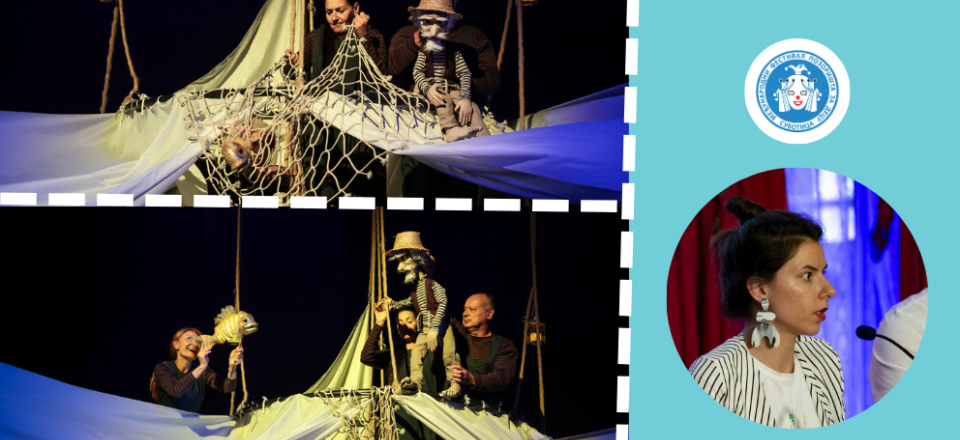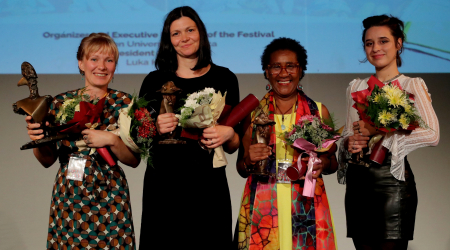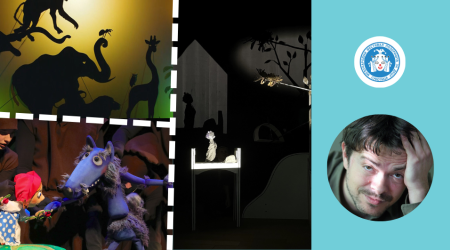News
What type of texts do we present in the theatre and what kind of world do we strive for?
Back to...
Puppet Theatre of Niš
Author: based on tale by A. S. Pushkin Adaptation: Nina Pavlović
Director: Vjera Vidov
Cast: Slobodan Miljković, Svetlana Mihajlović, Aleksandra Pavlović, Tatjana Milenković, Nataša Ristić
Stage and Puppet Design: Dušan Stanković, Dragana Breza
Music: Zoran Bulatović
In theatre for children, it is not uncommon for patriarchal patterns to be eternally perpetuated – hiding (just slightly modified) behind classic literature. Under the pretext of re-telling fairy tales and literary classics for children and adults, the flame of misogyny and patriarchy can often be found alive and well. Such is the case with the The Puppet Theatre of Niš’ production of The Tale of the Fisherman and the Fish (based on Pushkin's fairy tale) that presents its youngest audience with a world in which a woman’s duty is to clean her husband's feet who, in return, sends her off to cook in the kitchen. Such scenes are staged without a hint of criticism or any statement on protagonist’s actions.
The play starts off with a female crew on a ship. A crew member accidentally spills the lunch; since the ship’s captain and mates will be left hungry, the woman begins recounting the story of the fisherman and the fish. This is incredibly reminiscent of Scheherazade’s telling of tales in order to save dear life. The story is told by a ship’s crew member, but for some reason it seems as if the narrator is recalling and guessing the lines. The dramatization then adheres to the original fairy tale and the audience never learns the fate of the ship’s crew. In the play, the puppets are utilized for “a story within a story” technique in order to discern the two plotlines. It remains unclear why the actors use the puppets at all - as they are usually left next to them, motionless, while they deliver lines directly into the audience.
The type of content adapted for the stage and the way in which the themes are approached represent the world we wish to build. No girl or a boy should build a world which normalizes women cleaning their husbands’ feet or placing women behind a stove. The classic literature’s purpose is educational, but texts and their authors shouldn’t be untouchable so that their work cannot be updated or re-imagined. We should be teaching girls and boys that they are equally worthy, regardless of their sex and gender. We should teach the boys that the woman’s purpose is not to cook them lunch. We should educate children to strive for a better world with more equality. We should also teach the authors that the world outside their institutionalized theatres is changing and that educated women are conquering spaces outside the realm of kitchen and responsibilities other than cooking. So, you better not come complaining that the feminists didn't warn you.
Audience impressions after the play:
“I like theatre better than kindergarten.” (a girl, age 3)
“I was bored.” (a boy, age 7)
“It was fine.” (a boy, age 8)
“It’s too dark. They should turn on the light.” (a girl, age 7)
Divna Stojanov
Back to...-
 29 october 2024
29 october 2024Call for Proposals of Participants for 16th Theater Art Research Forum for Children and Youth
-
 25 october 2024
25 october 2024Open call for participation in the competition programme of the 32nd Festival
-
 28 september 2024
28 september 2024Don’t Wait for Me… announced the best play of the 31st International Festival of Children's Theatres Subotica
-
 02 october 2024
02 october 2024IS THERE ANYTHING MORE BEAUTIFUL THAN THE THEATRE?









